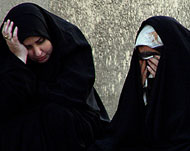Study of Iraqi Dead Shocking, But Sound Science
 The Statistical Assessment Service a non-profit, non-partisan media research organization affiliated with George Mason University and committed to correcting scientific misinformation in the media - finds the study estimating 650,000 excess Iraqi casualties since American forces entered the country to be methodologically sound.
The Statistical Assessment Service a non-profit, non-partisan media research organization affiliated with George Mason University and committed to correcting scientific misinformation in the media - finds the study estimating 650,000 excess Iraqi casualties since American forces entered the country to be methodologically sound.In an analyis released today, STATS Director of Research Dr. Rebecca Goldin defended the research technique of cluster sampling behind the study, writing that "the methods used by this study are the only scientific methods we have for discovering death rates in war torn countries without the infrastructure to report all deaths through central means. Instead of dismissing over half a million dead people as a political ploy ... we ought to embrace science as opening our eyes to a tragedy whose death scale has been vastly underestimated until now."
She goes into great detail about both the strengths of the research, as well as the arguments against it.
- Prior Support from the Scientific Community:
While the Lancet numbers are shocking, the study's methodology is not. The scientific community is in agreement over the statistical methods used to collect the data and the validity of the conclusions drawn by the researchers conducting the study. When the prequel to this study appeared two years ago by the same authors (at that time, 100,000 excess deaths were reported), the Chronicle of Higher Education published a long article explaining the support within the scientific community for the methods used.
- The Methodology of "Cluster Sampling":
Cluster sampling is a well-established in statistics, and is routinely used to estimate casualties in natural disasters or war zones. For the Iraq study the researchers randomly chose people to interview about deaths in their families, interviewed a cluster of households around them, and then extrapolated the results to the whole population. There is nothing controversial in the method itself, though people can certainly question whether the sampling was done correctly.
- Attacks on Study are Ideological, not Scientific:
There has been a wealth of material on the web attacking the Lancet study. Most of it is devoid of science, and ranges from outrage at the numbers (it's impossible to believe it could be so high), to accusations of bias based on the authors' views of U.S. foreign policy. Interested parties such as the Iraqi government responded quickly by calling the numbers "inflated" and "far from the truth", rather than putting forward any real reasons why these numbers are unlikely to have occurred. President Bush, for one, says he does "not consider it a credible report."
You can read Dr. Goldin's analysis in its entirety Here
Source


0 Comments:
Post a Comment
<< Home